[Dec 2007, Volume 4 Quarterly Issue] Pdf File size - The IIPM Think ...
[Dec 2007, Volume 4 Quarterly Issue] Pdf File size - The IIPM Think ...
[Dec 2007, Volume 4 Quarterly Issue] Pdf File size - The IIPM Think ...
Create successful ePaper yourself
Turn your PDF publications into a flip-book with our unique Google optimized e-Paper software.
MORE MARKETS, LESS GOVERNMENT<br />
and rights. <strong>The</strong> fact that the economy<br />
and its growth happens within the framework<br />
of a solemnly constituted nation<br />
bound by constitutional obligations,<br />
could give the poor and disadvantaged<br />
reasons to hope and aspire for an inclusive<br />
growth, something that the Finance<br />
Minister has also recently been referring<br />
to and on more than one occasion. If inclusive<br />
growth is not to become a mantra<br />
but serious policy, then it has important<br />
implications for the future of India as we<br />
know it. <strong>The</strong> future of India as a nation,<br />
as an idea that has so important a place<br />
in the comity of nations globally, will<br />
critically depend on how economic policy<br />
in our country deals with India’s large<br />
scale mass poverty. That remains and<br />
will remain the Indian economy’s most<br />
central problem; how economic policy<br />
deals with it, will be what makes or breaks<br />
economic growth and political stability;<br />
in the ultimate analysis our ability to<br />
break the poverty trap is what will determine<br />
whether we pull through as a society<br />
or descend gradually into chaos and<br />
anarchy. This reality needs to be stated<br />
upfront before entering into any discussion<br />
about state and markets.<br />
<strong>The</strong> State And Economists<br />
Faster growth rates in the economy has<br />
led to calls for an entirely market based<br />
economic growth model and to even assume<br />
that, the state is and can no longer<br />
be the primum mobilum of development.<br />
If that is so, then how does one deal with<br />
the question of the state when it comes to<br />
thorny problems such as poverty alleviation,<br />
social exclusion and gross societal<br />
inequalities that are a drag on the overall<br />
development of a nation. Often there is a<br />
scare tactic that is mounted about the<br />
dangers of a dirigistic state and which the<br />
Indian state hardly is, especially after the<br />
reforms of the 1990s and from the VIII<br />
Plan onwards. Once, the distinction between<br />
accepting a role for the state in<br />
development and that of a dirigistic state<br />
is deliberately blurred, it is easier to<br />
equate the two and call all state involvement<br />
as dirigistic and then try to figure<br />
out in the push for market friendly economic<br />
reforms how to reduce the role of<br />
the state. This then becomes a false debate.<br />
More critical than raising false<br />
clashes between state and market in the<br />
new millennium, is whether the state in<br />
developing societies such as India has a<br />
developmental role, if so how does then<br />
one define it and shape it? <strong>The</strong>re is no<br />
point in putting questions arising out of<br />
the 19th century and early 20th century<br />
problems that developed states have gone<br />
through and more so when most states,<br />
including the Indian state in an age of<br />
globalization are bending over backwards<br />
to be market and corporate friendly.<br />
<strong>The</strong>re is nothing in our ‘karma’ that says,<br />
we have to go through the routes other<br />
societies have gone through. Pluralistic<br />
and sensible approaches to economic<br />
policy making and economic reform in<br />
particular requires a profound understanding<br />
that economic policy making<br />
especially in open and still vibrant democracies<br />
as ours, is related to good governance<br />
as a public good and multiplier<br />
of economic efficiency. Good governance<br />
in a society of diverse groups, interests<br />
and pulls and pressures is an art. In a developmental<br />
strategy sense, governance<br />
is central to economic policy. For this the<br />
state has a critical role in the management<br />
of the political economy of the large<br />
economies as ours and with such large<br />
and varied socio-economic problems,<br />
agro-eco systems and federal political<br />
structure. Good governance is an important<br />
and critical public good and for<br />
which the state cannot be seen as an adversary<br />
by the market. Undermining the<br />
state has serious consequences for markets<br />
as well. <strong>The</strong> State can very well be<br />
undermined from within the State by<br />
market forces. Instead of tired debates<br />
about state versus markets, what we need<br />
is serious debate on better policy and<br />
polity, involving state and markets.<br />
Once, the distinction between accepting a role for the<br />
state in development and that of a dirigistic state is deliberately<br />
blurred, it is easier to equate the two and call all<br />
state involvement as dirigistic<br />
Better policy and polity that works to the<br />
welfare of the nation as a whole than satisfy<br />
the greed of a few be it business<br />
or politicians.<br />
Economics and economic growth is<br />
part of the complexity of social systems<br />
and their inbuilt injustices, contradictions<br />
and handicaps. To think that the<br />
problems of economic growth can be unraveled<br />
without reference to the social<br />
system, would mean that when the social<br />
system starts unraveling itself, it will<br />
sweep in its wake, all traces of economics<br />
development. This is an issue that many<br />
economists have tried to skirt. It may be<br />
fashionable amidst the greed and individualism<br />
in the wake of the benefits<br />
brought to the leisure classes as a result<br />
THE INDIA ECONOMY REVIEW<br />
17


![[Dec 2007, Volume 4 Quarterly Issue] Pdf File size - The IIPM Think ...](https://img.yumpu.com/29766298/16/500x640/dec-2007-volume-4-quarterly-issue-pdf-file-size-the-iipm-think-.jpg)
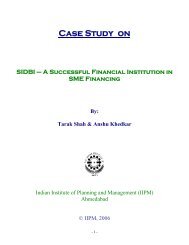
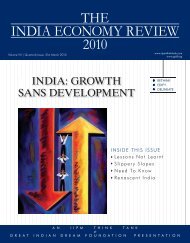
![[Feb 2008, Volume V Annual Issue] Pdf File size - The IIPM Think Tank](https://img.yumpu.com/43961117/1/190x245/feb-2008-volume-v-annual-issue-pdf-file-size-the-iipm-think-tank.jpg?quality=85)
![[June 2008, Volume V Quarterly Issue] Pdf File size - The IIPM Think ...](https://img.yumpu.com/41693247/1/190x245/june-2008-volume-v-quarterly-issue-pdf-file-size-the-iipm-think-.jpg?quality=85)

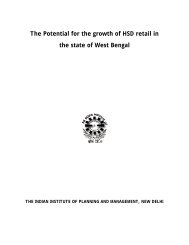
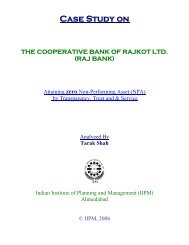
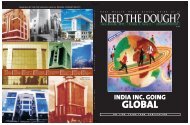

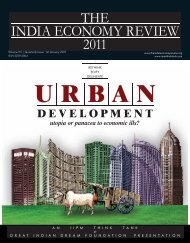

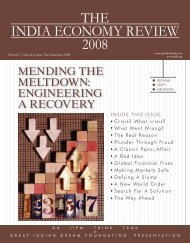
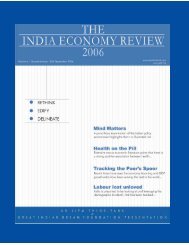
![[Volume VI | Quarterly Issue: 31st May 2009] Pdf File size](https://img.yumpu.com/27796051/1/190x245/volume-vi-quarterly-issue-31st-may-2009-pdf-file-size.jpg?quality=85)